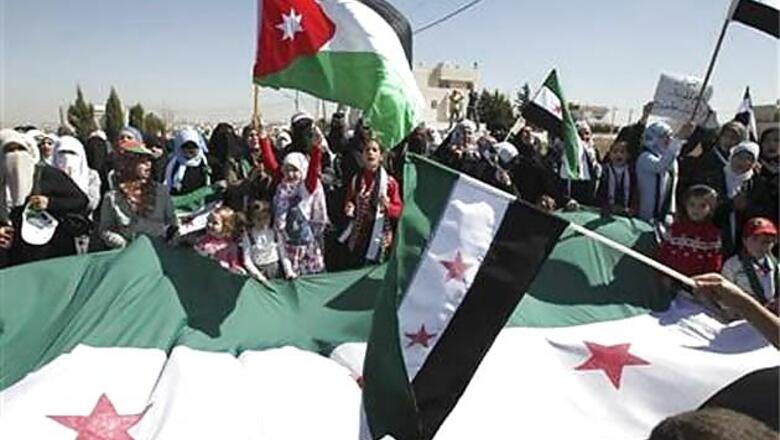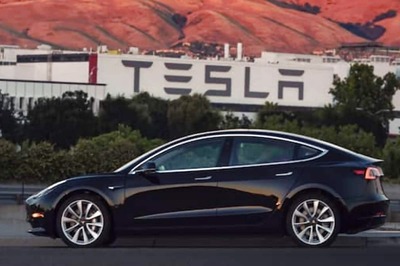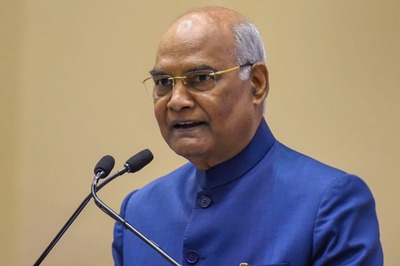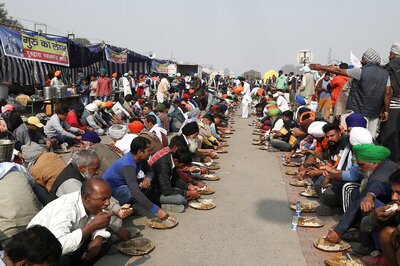
views
Baghdad: Arab leaders gathering in Baghdad on Thursday will call for Syria to implement a ceasefire, but there's little faith that President Bashar al Assad will do anything to halt his crackdown on the year-old uprising.
That could set the stage for Gulf Arab nations, eager to see Assad's downfall, to take stronger action on their own.
Arab governments are divided over how strongly to intervene to stop the bloodshed in Syria, and their divisions illustrate how the conflict has become a proxy in the region's wider rivalry - the one between Arabs and powerhouse Iran.
Sunni-led nations of the Gulf such as Saudi Arabia and Qatar - hoping to break Syria out of its alliance with Shiite Iran - are believed to be considering arming the Syrian rebels to fight back against Assad's forces. But other Arab nations are reluctant to openly call for that step yet.
Iraq, the host of the one-day Arab League summit, is in a particularly tight spot because its Shiite-led government has close ties to Iran, Assad's top ally.
Given the divisions, foreign ministers meeting here Wednesday laid out a middle-ground for their leaders to issue at the summit. The draft resolution they put together would reject foreign intervention in Syria while voicing support for the Syrian people's "legitimate aspirations to freedom and democracy." It would call on Assad to implement a cease-fire and let in humanitarian aid, according to a copy obtained by The Associated Press.
The leaders also "denounce the acts of violence, killings ... and remain committed to a peaceful settlement and national dialogue," it said.
It also supports the mission of joint UN-Arab League envoy Kofi Annan, who has put forward a peace plan to end the regime's crackdown that the UN estimates has killed more than 9,000 people since the uprising began in March 2011 as part of the Arab Spring.
Iraqi Foreign Minister Hoshyar Zebari acknowledged to the media that the summit will offer "nothing new" on Syria, but will complement ongoing international diplomacy to settle the crisis.
Damascus has accepted Annan's plan, which includes a cease-fire. Violence has continued, however, with clashes between government forces and armed rebels. Syria's opposition is deeply skeptical that Assad will carry out the terms of Annan's plan.
The plan also calls on Damascus to immediately stop troop movements and the use of heavy weapons in populated areas, and to commit to a daily two-hour halt in fighting to allow humanitarian access and medical evacuations.
Opposition members accuse Assad of agreeing to Annan's plan to stall for time as his troops make a renewed push to kill off bastions of dissent.
"We are not sure if it's political maneuvering or a sincere act," said Louay Safi, a member of the opposition Syrian National Council. "We have no trust in the current regime. ... We have to see that they have stopped killing civilians."
The Assad regime has pre-emptively rejected anything coming out of the Arab League summit, a reflection of its refusal to deal with the 22-member body since it suspended Syria's membership last year.
Iraq is hosting the annual summit for the first time in a generation, keen to show it has emerged from years of turmoil and US occupation. But the Syria issue has clouded its attempts to win acceptance by other Arab nations, which are deeply suspicious of its ties with Iran.
In a snub to Baghdad, most - if not all - of the rulers of the six Gulf nations were staying away from the summit, sending lower-level figures instead. League officials said the level of representation was aimed at showing their frustration over the lack of more assertive action on Syria.
Instead of its king, Saudi Arabia was sending its ambassador to the Arab League - a worse slap because the post is even lower than the foreign minister level. The League officials said Saudi Arabia and Qatar had wanted Iraq to invite representatives of the Syrian opposition to the summit. Baghdad declined, much to their dismay, the officials said, speaking on condition of anonymity because of the sensitivity of the subject.
Offering a glimpse of Qatar's thinking on the Syrian crisis, the prime minister of the tiny, energy-rich nation told Al-Jazeera television that it would be a "disgrace to all of us if the sacrifices of the Syrian people go to waste."
"We are faced with a difficult choice - either we stand by the Syrian people or stand by him (Assad)," said Sheik Hamad bin Jassim al-Thani.
The Gulf nations, particularly Saudi Arabia and Qatar, have been pushing behind the scenes for more assertive action to end the conflict. Privately, they see little benefit in the Arab League's efforts to reach a peaceful settlement and prefer instead to see a small core of nations joining together to act on their own.
Among the options they are considering are arming the Syrian rebels and creating a safe haven for the opposition along the Turkish-Syrian border to serve as a humanitarian sphere or staging ground for anti-regime forces. Such a step would require help from Turkey - the country best positioned to defend such a safe haven - but so far Ankara has seemed reluctant.
For Gulf nations, removing Assad would almost certainly break Syria's alliance with Iran, disrupting the sphere of Tehran's influence that now extends from Iraq and across Syria to the shores of the Mediterranean. Syria's Sunni majority makes up the bulk of the uprising. Assad's regime is dominated by his own Alawite sect, a minority offshoot of Shiite Islam.
Zebari, Iraq's foreign minister, said the summit would not demand that Assad step down. But he later said Iraq "could no longer remain neutral" in the face of the violence in Syria.
He did not elaborate, but added that the Syria crisis was headed toward "internationalization," maintaining that the Arab League already has done all it could to resolve the conflict.
Zebari, however, is a Sunni Kurd and his pronouncements may not accurately reflect the views of the Shiite Prime Minister Nouri al-Maliki and the all-powerful Shiite political establishment backing him.
In a possible breakthrough in Iraq's relations with Bahrain - one of the Gulf Cooperation Council's six members - al-Maliki met on the sidelines of Wednesday's meeting of Arab foreign ministers with Bahrain's foreign minister, Sheik Khalid bin Ahmed Al Khalifa. No details emerged from their meeting.




















Comments
0 comment